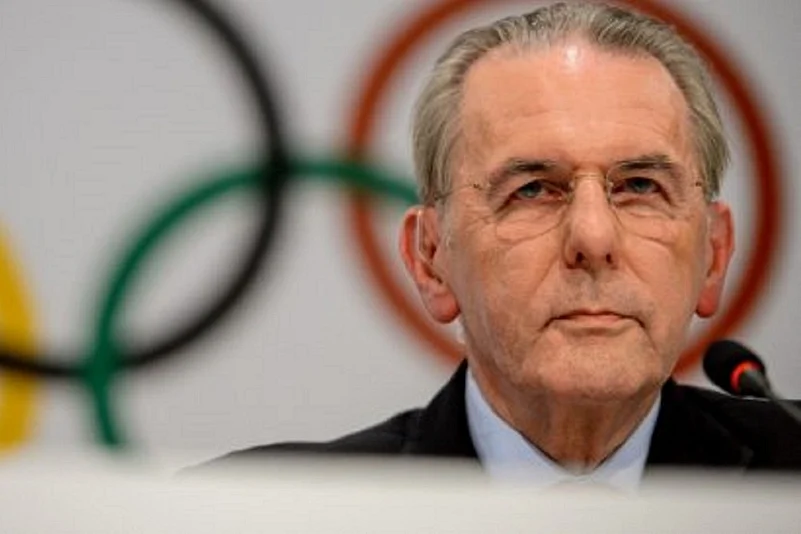Jacques Rogge, who oversaw an era of political and financial stability in the Olympic movement after its worst ethics scandal and pursued a hard line against doping during his 12 years as IOC president, has died, the Olympic organization said Sunday. He was 79. (More Sports News)
The International Olympic Committee announced his death without giving details. Rogge's health had visibly declined when he attended Olympic events since his presidency ended in 2013.
“First and foremost, Jacques loved sport and being with athletes — and he transmitted this passion to everyone who knew him,” Thomas Bach, Rogge's successor as president, said in an IOC statement. “His joy in sport was infectious.”
Rogge, a former orthopedic surgeon from Belgium, guided the IOC through a period of relative calm and prosperity during a term that spanned three Summer Olympics and three Winter Games from 2001-2013.
A three-time Olympian in sailing, Rogge earned praise for bringing a steady hand to the often turbulent world of Olympic politics but also faced outside criticism for not being tough enough on human rights issues with China and Russia.
Under Rogge's watch, the IOC took the Olympics to new countries and continents — awarding the first Summer Games to South America (Rio de Janeiro in 2016) and the first Winter Games to Russia (Sochi 2014) and South Korea (Pyeongchang 2018).
Rogge was elected the IOC's eighth president in Moscow on July 16, 2001, defeating four other candidates to succeed Juan Antonio Samaranch, a Spaniard who ran the committee with an authoritarian and imperious style for 21 years.
Rogge took office in the wake of the Salt Lake City corruption scandal, in which 10 IOC members resigned or were expelled for receiving scholarships, payments and lavish gifts during the Utah capital's winning bid for the 2002 Winter Games.
Rogge enjoyed a “Mr. Clean” reputation and moved quickly to break with the IOC's tainted and elitist image. Within hours of coming to power, he announced that he would stay in the athletes' village rather than the IOC hotel during the Salt Lake Olympics. (He continued the practice at subsequent games, though he also would stay in the official hotel when he had important meetings).
After serving an initial eight-year term, Rogge was re-elected unopposed in 2009 to a second and final four-year mandate. He stepped down in September 2013 in Buenos Aires, where Germany's Thomas Bach was elected as his successor.
Rogge spoke five languages, a big selling point in the multi-lingual IOC. His native tongue was Flemish or Dutch, but he also spoke French, English, Spanish and German.
Rogge presided over Summer Olympics in Athens (2004), Beijing (2008) and London (2012), and Winter Games in Salt Lake City (2002), Turin (2006) and Vancouver (2010).
Salt Lake City came just months after the Sept. 11, 2001, terror attacks. Rogge consulted with then-President George W. Bush about security measures for the games, which went off peacefully. Preparations for the Athens Games were dogged by chronic delays. Beijing was surrounded by controversy over China's record on Tibet, human rights and press freedom.
Human rights groups accused Rogge and the IOC of failing to speak out against abuses in China and Russia. Rogge espoused “quiet diplomacy” and insisted repeatedly that the IOC was a sports organization, not a government or political body.
Rogge said the darkest moment of his presidency was the death of Georgian luger Nodar Kumaritashvili, who was killed in a high-speed training crash hours before the 2010 opening ceremony in Vancouver.
While Samaranch and the IOC were criticized for a perceived laxness on performance-enhancing drugs, Rogge initiated a high-profile “zero tolerance” policy on doping.
He doubled the number of drug tests at the Olympics to 5,000, instituted rigorous pre-games and out-of-competition checks and retested samples from previous games to catch cheaters retroactively.
Rogge warned frequently about the threat of match-fixing and illegal betting, setting up a dedicated unit to monitor betting patterns during the Olympics. He applied a hard line on ethics, suspending or forcing out members implicated in any violations and holding firm to the post-Salt Lake City ban on member visits to bid cities.
Rogge's views were not always well received: He was criticized as being out of touch when he chided Usain Bolt for showboating in Beijing and questioned whether the Jamaican sprinter was a “living legend” in London.
Rogge came under fire from Jewish groups for refusing to allow a moment of silence at the London opening ceremony to remember the 11 Israeli team members killed by Palestinian gunmen at the 1972 Munich Games. He did take part in special commemorations for the Israelis outside of the ceremonies.
Seeking to contain the size and cost of the Olympics, Rogge instituted a cap of 10,500 athletes and 28 sports for the Summer Games. Still, there were about 11,000 athletes and 33 sports at the Tokyo Olympics that closed this month.
Lamenting a rise in youth obesity and seeking to get young people off the couch, Rogge developed his pet project — the Youth Olympic Games. The event, for athletes aged 15 to 18, was designed to involve educational and cultural experiences as well as sports competition.
The Summer Youth Games debuted in Singapore in 2010, with the second edition held in Nanjing, China, in August 2014.
The IOC's financial security strengthened under Rogge's tenure. Revenues from global sponsors grew from $663 million in 2001-04 to nearly $1 billion for the four-year cycle through London. Television rights deals raised billions, including a $4.38 billion deal with NBC through the 2020 Tokyo Olympics.
The IOC's reserves rose from $100 million to $900 million over 10 years.
Rogge's health declined in the final years of his presidency. He underwent hip replacement surgery in September 2012 and looked a far cry from the youthful, robust man who came to power.
Rogge is survived by his wife, Anne, and their two adult children.
















